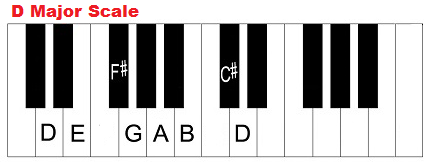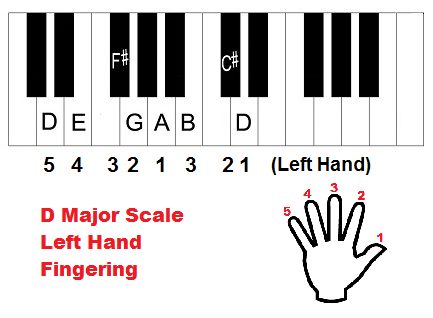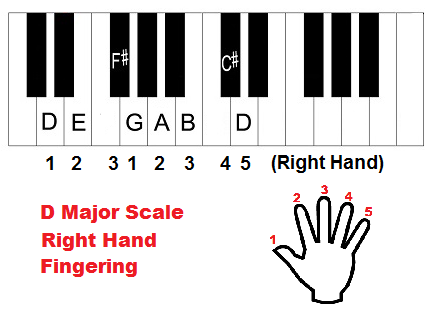The notes of the D major scale are D – E – F# – G – A – B – C# – D. The note, D repeats one octave higher. Its key signature has two sharps.
Scale Intervals
- Tonic: D
- Major 2nd: E
- Major 3rd: F#
- Perfect 4th: G
- Perfect 5th: A
- Major 6th: B
- Major 7th: C#
- Perfect 8th: D

Highly Recommended: Click here for one of the BEST piano/keyboard courses I’ve seen online.
Scale Degrees
- Tonic: D
- Supertonic: E
- Mediant: F#
- Subdominant: G
- Dominant: A
- Submediant: B
- Leading tone: C#
- Octave: D
Diagram of this scale on the treble clef:
Diagram of scale on the bass clef:
Video:
Major scales are constructed with the formula W – W – H – W – W – W – H. “W” represents a whole step, while “H” represents a half step. Let’s build a D major scale starting on D. From D we will take a whole step to E. From the note E, we will take another whole step to F#. Next, we will go up a half step to G. From G, a whole step will take us to A. Next is another whole step to B. The last whole step takes us to C#. Finally, the half step returns us to D (one octave higher).
D Major Scale Piano Fingering
What’s the fingering for this scale? It’s as follows:
- Notes: D, E, F#, G, A, B, C#, D
- Fingerings (Left Hand): 5, 4, 3, 2, 1, 3, 2, 1
- Fingerings (Right Hand): 1, 2, 3, 1, 2, 3, 4, 5
(Thumb is finger 1, index finger is finger 2, middle finger is 3, ring finger is 4 and pinky finger is 5.) 

Here’s a video showing how to play the D major scale on piano (keyboard):
What are the triad chords in the key of D? They are as follows:
- Chord I: D major. Its notes are D – F# – A.
- Chord ii: E minor. Its notes are E – G – B.
- Chord iii: F# minor. Its notes are F# – A – C#.
- Chord IV: G major. Its notes are G – B – D.
- Chord V: A major. It’s notes are A – C# – E.
- Chord vi: B minor. Its notes are B – D – F#.
- Chord vii: C# diminished. Its notes are C# – E – G.
Diatonic Triads in key of D major: D – Em – F#m – G – A – Bm – C#dim
Here’s a video showing chords in the key of D major on piano (keyboard):
The relative minor of D major is B minor. The relative minor of a major key is based on the 6th note of the major scale. Major scales and their relative minors share the same notes. The notes of the B minor scale are: B – C# – D – E – F# – G – A – B
Modes:
- Ionian/Major Scale: D – E – F# – G – A – B – C# – D
- Dorian: E – F# – G – A – B – C# – D – E
- Phrygian: F# – G – A – B – C# – D – E – F#
- Lydian: G – A – B – C# – D – E – F# – G
- Mixolydian: A – B – C# – D – E – F# – G – A
- Aeolian/Natural minor scale: B – C# – D – E – F# – G – A – B
- Locrian: C# – D – E – F# – G – A – B – C#
Piano Keyboard Lessons Home Page